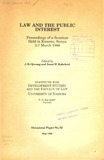| dc.description.abstract | This volume contains the proceedings of the first of a
series of seminars initiated in 1985 by the Faculty of
Law. The series focussed on some of the main areas of
teaching, research and dissemination of legal thought.
The initiative for the series sprung from the ingenuity of
some scholars, particularly Dr. C. O. Okidi, Chairman of
the Faculty's Research, Library and Legal Publications
Committee.
In Africa, the law, especially enacted law, has been seen
as the main instrument for implementing economic and
political policy and for resolving stresses arising from
policy decisions. This approach to societal problems
prevailed even in colonial times, when the legal process
was used to facilitate political and economic management
programs. Partial responsibility for the chronic underdevelopment
of much of Africa before independence lies
with this use of the law.
That such a role for the legal process still remains was
considered intriguing enough to justify new,
development-based studies in the Faculty of Law. Law
has a role in stabilizing social institutions, and changes
wrought by development initiatives need to be founded on
institutional stability. Thus, how law responds to
development is an important subject.
Of the several seminar proposals prepared by the
Faculty, the first to attract the interest of donors and
participants was the one on "Law and the Public
Interest." The purpose of the seminar was to consider,
through specific examples, the role of law in promoting
and safeguarding the public interest. Public interest here
refers to a whole set of developmental matters set to
benefit people socially, economically, culturally and in
other related senses.
Development in Africa is primarily state-directed. The
private sector, even when ostensibly dominant, is regulated
by the state through legislated codes or administrative
practices. In many third world countries, the state,
through its ability to command bureaucratic, financial and
technological resources, becomes the main agent in
mobilizing development. Public interest then includes
those expectations which the citizens entertain in
exercising their civil status. The state generally intervenes
in the interest of its citizens through the device of
law. Thus, clear perspectives need to be developed on the
interplay between the law and the public interest in the
process of national development.
This concern is shown in the character, form and order
of these proceedings. We hope that this volume will be
useful to scholars and policy makers, as well as providing
a basis for more specialized discussions on important
topics such as population and resource management, the
character of the law and its effectiveness in relation to
policy, and resource rent and taxation.
Funding for the seminar came from the International
Development Research Centre (IDRC), the National
Council for Science and Technology (NCST) and the
University of Nairobi. We are greatly indebted to these
donors for supporting the seminar and for permitting the
use of the remainder of the funds to produce this volume.
We also appreciate the role played by the participating
scholars, from as far afield as Botswana, Cote d'Ivoire,
Egypt, Indonesia and the United Kingdom. This kind of
participation brought forth the experience of many societies,
in both the industrialized and the non-industrialized
world.
We acknowledge the co-operation of members of the
Faculty of Law who performed a number of essential
tasks during the seminar, including serving as chairmen
of sessions, rapporteurs and discussants. We thank Mr.
A. G. Ringera, who served as chairman of the Kisumu
Seminar Committee.
Finally, we are indebted to the Institute for Development
Studies for agreeing to have this work published in
its Occasional Paper Series. Apart from the IDS personnel,
in particular Dr. I. Riak, the Seminar Co-ordinator,
we have also greatly benefited from the assistance of
Alison Field-Juma of Initiatives Ltd. for editing and
production, and of Dr. Calestous Juma of the African
Centre for Technology Studies. Special thanks are due to
Dr. John Oucho, of the Population Studies and Research
Institute, who helped edit the two papers on population. | en_US |



